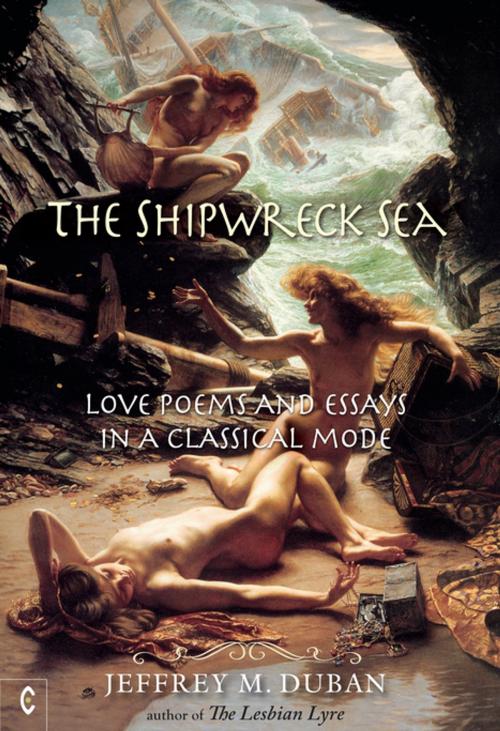The Shipwreck Sea
Love Poems and Essays in a Classical Mode
Fiction & Literature, Poetry, Anthologies, Literary Theory & Criticism| Author: | Jeffrey M. Duban | ISBN: | 9781912992010 |
| Publisher: | Rudolf Steiner Press | Publication: | April 12, 2019 |
| Imprint: | Clairview Books | Language: | English |
| Author: | Jeffrey M. Duban |
| ISBN: | 9781912992010 |
| Publisher: | Rudolf Steiner Press |
| Publication: | April 12, 2019 |
| Imprint: | Clairview Books |
| Language: | English |
Sappho, in the words of poet Algernon Charles Swinburne (1837–1909), was “simply nothing less – as she is certainly nothing more – than the greatest poet who ever was at all.” Born over 2,600 years ago on the Greek island of Lesbos, Sappho, the namesake lesbian, wrote amorously of men and women alike, exhibiting both masculine and feminine tendencies in her poetry and life. What’s left of her writing, and what we know of her, is fragmentary, and thus ever subject to speculation and study.
The Shipwreck Sea highlights the love poetry of the soulful Sappho, the impassioned Ibycus, and the playful Anacreon, among other Greek lyric poets of the age (7th to 5th centuries BC), with verse translations into English by author Jeffrey Duban. The book also features selected Latin poets who wrote on erotic themes – Catullus, Lucretius, Horace, and Petronius – and poems by Charles Baudelaire, with his milestone rejoinder to lesbian love (“Lesbos”) and, in the same stanzaic meter, a turn to the consoling power of memory in love’s more frequently tormented recall (“Le Balcon”). Duban also translates selected Carmina Burana of Carl Orff, the poems frequently Anacreontic in spirit.
The book’s essays include a comprehensive analysis with a new translation of Horace’s famed Odes 1.5 (“To Pyrrha”), in which the theme of (love’s) shipwreck predominates, and an opening treatise-length argument – exploring painting, sculpture, literature, and other Western art forms – on the irrelevance of gender to artistic creation. (No, Homer was not a woman, and it would make no difference if she were.) Twenty full-color artwork reproductions, masterpieces in their own right, illustrate and bring Duban’s argument to life.
Finally, Duban presents a selection of his own love poems, imitations and pastiches written over a lifetime – these composed in the “classical mode”, which is the leitmotif of this volume. The Shipwreck Sea is a delightful and continually thought-provoking companion to The Lesbian Lyre, both books vividly demonstrating that classicism yet thrives in our time, despite the modernism marshaled against it.
Sappho, in the words of poet Algernon Charles Swinburne (1837–1909), was “simply nothing less – as she is certainly nothing more – than the greatest poet who ever was at all.” Born over 2,600 years ago on the Greek island of Lesbos, Sappho, the namesake lesbian, wrote amorously of men and women alike, exhibiting both masculine and feminine tendencies in her poetry and life. What’s left of her writing, and what we know of her, is fragmentary, and thus ever subject to speculation and study.
The Shipwreck Sea highlights the love poetry of the soulful Sappho, the impassioned Ibycus, and the playful Anacreon, among other Greek lyric poets of the age (7th to 5th centuries BC), with verse translations into English by author Jeffrey Duban. The book also features selected Latin poets who wrote on erotic themes – Catullus, Lucretius, Horace, and Petronius – and poems by Charles Baudelaire, with his milestone rejoinder to lesbian love (“Lesbos”) and, in the same stanzaic meter, a turn to the consoling power of memory in love’s more frequently tormented recall (“Le Balcon”). Duban also translates selected Carmina Burana of Carl Orff, the poems frequently Anacreontic in spirit.
The book’s essays include a comprehensive analysis with a new translation of Horace’s famed Odes 1.5 (“To Pyrrha”), in which the theme of (love’s) shipwreck predominates, and an opening treatise-length argument – exploring painting, sculpture, literature, and other Western art forms – on the irrelevance of gender to artistic creation. (No, Homer was not a woman, and it would make no difference if she were.) Twenty full-color artwork reproductions, masterpieces in their own right, illustrate and bring Duban’s argument to life.
Finally, Duban presents a selection of his own love poems, imitations and pastiches written over a lifetime – these composed in the “classical mode”, which is the leitmotif of this volume. The Shipwreck Sea is a delightful and continually thought-provoking companion to The Lesbian Lyre, both books vividly demonstrating that classicism yet thrives in our time, despite the modernism marshaled against it.















